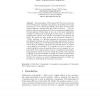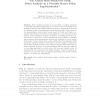23 search results - page 4 / 5 » Randomized Traitor Tracing Algorithms for Broadcast Security |
EUROCRYPT
2006
Springer
13 years 9 months ago
2006
Springer
The Isomorphism of Polynomials (IP) [28], which is the main concern of this paper, originally corresponds to the problem of recovering the secret key of a C scheme [26]. Besides, t...
CCS
2007
ACM
13 years 11 months ago
2007
ACM
A group key agreement protocol (GKA) allows a set of players to establish a shared secret key which can be used to secure a subsequent communication. Several efficient constantrou...
CCS
2005
ACM
13 years 11 months ago
2005
ACM
We introduce a new cryptographic primitive, called insubvertible encryption, that produces ciphertexts which can be randomized without the need of any key material. Unlike plain u...
WISA
2009
Springer
13 years 12 months ago
2009
Springer
Power analysis has shown to be successful in breaking symmetric cryptographic algorithms implemented on low resource devices. Prompted by the breaking of many protected implementat...
SP
2009
IEEE
14 years 1 days ago
2009
IEEE
Malware authors have recently begun using emulation technology to obfuscate their code. They convert native malware binaries into bytecode programs written in a randomly generated...



